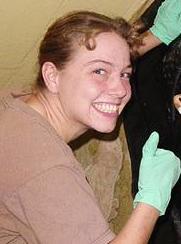Related Research Articles

The United States Disciplinary Barracks (USDB), colloquially known as Leavenworth, is a military correctional facility located on Fort Leavenworth, a United States Army post in Kansas. It is one of two major prisons built on Fort Leavenworth property, the other is the military Midwest Joint Regional Correctional Facility, which opened on 5 October 2010. It reports to the United States Army Corrections Command and its commandant usually holds the rank of colonel.

Lynndie Rana England is a former United States Army Reserve soldier who was prosecuted for mistreating detainees during the Abu Ghraib torture and prisoner abuse that occurred at the Abu Ghraib prison in Baghdad during the Iraq War. She was one of 11 military personnel from the 372nd Military Police Company who were convicted in 2005 for war crimes. After being sentenced to three years in prison and a dishonorable discharge, England was incarcerated from September 27, 2005, to March 1, 2007, when she was released on parole.

Charles A. Graner Jr. is an American former soldier who was court-martialed for prisoner abuse after the 2003–2004 Abu Ghraib prisoner abuse scandal. Along with other soldiers of his Army Reserve unit, the 372nd Military Police Company, Graner was accused of allowing and inflicting sexual, physical, and psychological abuse on Iraqi detainees in Abu Ghraib prison, a notorious prison in Baghdad during the United States' occupation of Iraq.

Sabrina D. Harman is a former American soldier who was court-martialed by the United States Army for prisoner abuse after the 2003–2004 Abu Ghraib prisoner abuse scandal. Along with other soldiers of her Army Reserve unit, the 372nd Military Police Company, she was accused of allowing and inflicting physical and psychological abuse on Iraqi detainees in Abu Ghraib prison, a notorious prison in Baghdad during the United States' occupation of Iraq.

Jeremy Charles Sivits was a United States Army reservist. He was one of several soldiers charged and convicted by the U.S. Army in connection with the 2003–2004 Abu Ghraib prisoner abuse scandal in Baghdad, Iraq, during and after the 2003 invasion of Iraq. Sivits was a member of the 372nd Military Police Company during this time.
Megan Ambuhl is a former United States Army Reserve soldier who was convicted of dereliction of duty for her role in the prisoner abuse that occurred at Abu Ghraib prison, a notorious prison in Baghdad during the United States' occupation of Iraq.

Ivan "Chip" Frederick II is an American former soldier who was court-martialed for prisoner abuse after the 2003–2004 Abu Ghraib prisoner abuse scandal. Along with other soldiers of his Army Reserve unit, the 372nd Military Police Company, Frederick was accused of allowing and inflicting sexual, physical, and psychological abuse on Iraqi detainees in Abu Ghraib prison, a notorious prison in Baghdad during the United States' occupation of Iraq. In May 2004, Frederick pleaded guilty to conspiracy, dereliction of duty, maltreatment of detainees, assault, and indecent acts. He was sentenced to 8 years' confinement and loss of rank and pay, and he received a dishonorable discharge. He was released on parole in October 2007, after spending four years in prison.

During the early stages of the Iraq War, members of the United States Army and the Central Intelligence Agency committed a series of human rights violations and war crimes against detainees in the Abu Ghraib prison in Iraq, including physical abuse, sexual humiliation, physical and psychological torture, and rape, as well as the killing of Manadel al-Jamadi and the desecration of his body. The abuses came to public attention with the publication of photographs of the abuse by CBS News in April 2004. The incidents caused shock and outrage, receiving widespread condemnation within the United States and internationally.
About six months after the United States invasion of Iraq of 2003, rumors of Iraq prison abuse scandals started to emerge.
Mullah Habibullah was an Afghan who died on December 4, 2002 while in US custody at the Bagram Collection Point, a US military detention center in Afghanistan. His death was one of those classed as a homicide, though the initial military statement described his death as due to natural causes.
Abed Hamed Mowhoush was an air vice-marshal believed to be in command of the transport, logistics and airlifting division of the Iraqi Air Force during the regime of Saddam Hussein immediately prior to the 2003 Invasion of Iraq, until his surrender to United States forces on 10 November 2003. He died on 26 November 2003 while in U.S. custody at the Al-Qaim detention facility approximately 200 miles (320 km) northwest of Baghdad, following a 16-day period of detention.

In 2005, The New York Times obtained a 2,000-page United States Army investigatory report concerning the homicides of two unarmed civilian Afghan prisoners by U.S. military personnel in December 2002 at the Bagram Theater Internment Facility in Bagram, Afghanistan and general treatment of prisoners. The two prisoners, Habibullah and Dilawar, were repeatedly chained to the ceiling and beaten, resulting in their deaths. Military coroners ruled that both the prisoners' deaths were homicides. Autopsies revealed severe trauma to both prisoners' legs, describing the trauma as comparable to being run over by a bus. Seven soldiers were charged in 2005.

Dilawar, also known as Dilawar of Yakubi, was an Afghan farmer and taxi driver who was tortured to death by US Army soldiers at the Bagram Collection Point, a US military detention center in Afghanistan.
Nagem Hatab was an Iraqi who died on June 3, 2003, while in US custody. Hatab is said to have been a Ba'ath party member.

Abdul Wali was an Afghan farmer who died in United States custody on June 21, 2003, at the age of 28. At the time of his death, he had been held for three days at the US base 10 miles (16 km) south of Asadabad, in Kunar Province, Afghanistan, on suspicion of involvement in a rocket attack on the same base, after voluntarily handing himself in. The local governor, Said Akbar, had told Wali to turn himself in so he could clear his name.
The Mahmudiyah rape and killings were a series of war crimes committed by five U.S. Army soldiers during the U.S. occupation of Iraq, involving the gang-rape and murder of 14-year-old Iraqi girl Abeer Qassim Hamza al-Janabi and the murder of her family on March 12, 2006. It occurred in the family's house to the southwest of Yusufiyah, a village to the west of the town of Al-Mahmudiyah, Iraq. Other members of al-Janabi's family murdered by American soldiers included her 34-year-old mother Fakhriyah Taha Muhasen, 45-year-old father Qassim Hamza Raheem, and 6-year-old sister Hadeel Qassim Hamza al-Janabi. The two remaining survivors of the family, 9-year-old brother Ahmed and 11-year-old brother Mohammed, were at school during the massacre and orphaned by the event.

Herman Perry was an African-American U.S. Army soldier during World War II, who deserted after fragging an unarmed white lieutenant attempting to arrest him. After being sentenced to death, he escaped custody, and a manhunt was launched while he lived in the jungle. Perry was eventually recaptured once more and court-martialed. He was hanged for murder and desertion, making him the only American soldier executed in the China Burma India Theater during World War II.
Members of the United States Armed Forces have violated the law of war after the signing of the Hague Conventions of 1899 and 1907 and the signing of the Geneva Conventions. The United States prosecutes offenders through the War Crimes Act of 1996 as well as through articles in the Uniform Code of Military Justice. The United States signed the 1999 Rome Statute but it never ratified the treaty, taking the position that the International Criminal Court (ICC) lacks fundamental checks and balances. The American Service-Members' Protection Act of 2002 further limited US involvement with the ICC. The ICC reserves the right of states to prosecute war crimes, and the ICC can only proceed with prosecution of crimes when states do not have willingness or effective and reliable processes to investigate for themselves. The United States says that it has investigated many of the accusations alleged by the ICC prosecutors as having occurred in Afghanistan, and thus does not accept ICC jurisdiction over its nationals.

The Maywand District murders were the thrill killings of at least three Afghan civilians perpetrated by a group of U.S. Army soldiers from January to May 2010, during the War in Afghanistan. The soldiers, who referred to themselves as the "Kill Team", were members of the 3rd Platoon, Bravo Company, 2nd Battalion, 1st Infantry Regiment, and 5th Brigade, 2nd Infantry Division. They were based at FOB Ramrod in Maiwand, in Kandahar Province of Afghanistan.

Capital punishment as a criminal punishment for homosexuality has been implemented by a number of countries in their history. It is a legal punishment in several countries and regions, all of which have sharia–based criminal laws, except for Uganda.
References
- 1 2 3 4 5 6 7 8 9 "Killing Drives Wedge Between Troops". Los Angeles Times. October 18, 2004. Retrieved 2022-05-26.
- 1 2 "US soldier jailed for killing Iraqi man". DAWN.COM. 2004-09-27. Retrieved 2022-05-26.
- 1 2 "Court-martial records: Guard member killed Iraqi after sex". Spartanburg Herald Journal. Retrieved 2022-05-26.
- 1 2 "US soldier gets 25 years for Iraq murder". www.aljazeera.com. Retrieved 2022-05-26.